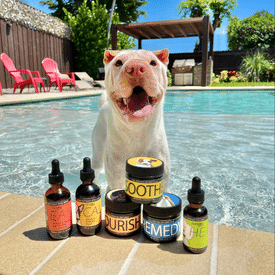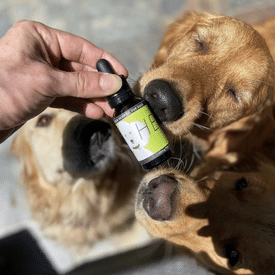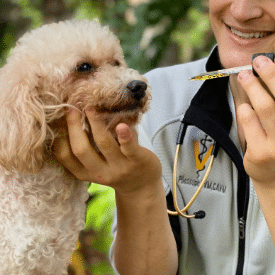CBD for Dogs with Cancer

Looking to learn more about CBD oil for dogs with cancer? If you have access to social media, chances are you have seen someone online discussing how CBD helped their friend, neighbor, dog walker, or mailman with cancer. It is easy to write it off as anecdotal evidence, but is there something to the claim that CBD can help with tumors and cancer? And if so, should you give your pet who has cancer or tumors CBD to help their body fight the cancer? Let’s get into the science of CBD for dogs with cancer.
Table of Contents
Cancers in Dogs
Cancer is, by definition, “a disease caused by an uncontrolled division of abnormal cells in a part of the body.” So basically, cancer in dogs is when normal cells become abnormal and grow uncontrollably, leading to organ and system dysfunction. Dogs are built to be survivors and often do not show pain or illness until it has progressed significantly. This makes early diagnosis difficult, especially for relatively hidden cancers like hemangiosarcoma, whose symptoms can often be confused with less harmful illnesses or disorders.
Unfortunately, the prevalence and diversity of cancer in dogs have increased over the past few decades. Dogs suffer from almost all the same cancers we humans do. Let’s go over the most common canine cancers:
-
Melanoma in Dogs
- Melanoma is a cancer originating in the cells that give skin its pigment (melanocytes). This type of cancer is most often found in the mouth (gums, lips, palate) and feet but can occur anywhere on the body. Tumors are usually dark/pigmented but can be colorless/pink in many cases. The tumor will grow in size quickly. This type of cancer is typically aggressive and can spread (metastasize) if not treated.
- Diagnosis depends on the location and size of the tumor and can involve X-rays, ultrasounds, and CT scans to check for metastasis.
- Treatment can vary. Standard treatment involves surgical removal, as well as radiation.
-
Carcinoma in Dogs
- Carcinoma (also called Squamous Cell Carcinoma) is another type of skin cancer. However, unlike melanoma, carcinoma tumors are usually slow growing. They can be found throughout the body but are most commonly found in the nailbed, mouth, abdomen, and toes. Interestingly, the dog breed often correlates with the tumor’s location. For example, SCC is most often found in the digits (toes) of Labs and Rottweilers, and in light-colored, sparsely-haired breeds like white bull terriers and whippets, it’s more commonly found in the skin. Metastasis is rare with SCC, but it depends on the location of the tumor and its proximity to lymph nodes.
- Diagnosis involves a Fine Needle Aspiration (FNA) procedure, where your vet takes a small tumor sample via a needle and syringe and examines it under a microscope. If the diagnosis is not definitive, then a biopsy may be warranted. A biopsy is a surgical excision (removal) of the tumor, which is then sent to a pathologist for further evaluation.
- Treatment is commonly surgical tumor removal.
-
Mastocytoma / Mast Cell Tumors in Dogs
- Mast Cell Tumor (MCT) is a prevalent type of cancer that usually appears as a lump on the skin that can often appear harmless. However, it can also be internal, affecting the spleen, liver, or bone marrow. Mast cells are a normal part of the histamine/allergic response. However, these cells can act inappropriately and form malignant tumors. Cancerous mast cells behave in a way that can cause many other issues, such as stomach ulcers.
- Diagnosis of MCT involves FNA, similar to other skin cancers.
- Treatment involves surgical removal. Radiation is the preferred option for tumors that cannot be easily surgically removed or if removal was incomplete due to the tumor’s location. Most dogs with a history of or current MCT will be given an antihistamine like Benedryl to reduce the side effects of the tumor (degranulation).
-
Lymphoma in Dogs
- Lymphoma is a lymphatic system cancer (lymph nodes, spleen, tonsils, lymphatic vessels). It may be localized to one area (like the lymph nodes surrounding the head) or be systemic (throughout the body). There are four types of lymphoma (in order of prevalence):
- Multicentric (systemic) lymphoma is the most common form. Every lymph node is affected.
- Alimentary lymphoma is a type of lymphoma affecting the gastrointestinal tract.
- Mediastinal lymphoma is a rare type of lymphoma affecting the lymphoid organs of the chest.
- Extranodal lymphoma: this type of lymphoma targets an organ outside of the lymphatic system, such as the skin, eyes, lungs, or nervous system.
- Diagnosis: if not picked up on a routine veterinary exam, most owners first notice their dog’s lymph nodes are enlarged, which prompts a vet visit and thorough exam. Many dogs show no other signs of illness, but some may start to show symptoms such as lethargy and weight loss. Again, an FNA will be performed to determine if the swollen lymph nodes contain cancerous cells. A surgical biopsy will be needed if an FNA cannot be performed. Bloodwork will also be done to check for any abnormalities that could point to cancer. Your vet may do further testing to determine the type of lymphoma cells, and staging them, which will determine the aggressiveness of the cancer and how to treat it best. X-rays and ultrasounds may also be performed.
- Lymphoma is almost always treated with chemotherapy. If the owner does not elect chemotherapy, the only other conventional option is prednisone. Prednisone will not stop the cancer and is used as a palliative care option to maintain quality of life until a certain point has been reached where it is no longer reducing the signs of lymphoma. Depending on the treatment chosen, survival time can be anywhere from 4 weeks to one year.
- Lymphoma is a lymphatic system cancer (lymph nodes, spleen, tonsils, lymphatic vessels). It may be localized to one area (like the lymph nodes surrounding the head) or be systemic (throughout the body). There are four types of lymphoma (in order of prevalence):
-
Leukemia in Dogs
- Leukemia, also called Chronic Lymphocytic Leukemia (CLL), is a cancer of a specific type of white blood cell called lymphocytes. It usually originates in the bone marrow and spleen. There are three types of CLL: T cell, B cell, and atypical CLL.
- Diagnosis of CLL usually happens by surprise via routine blood screening. This is why regular bloodwork is so important to have done on your dog. Suppose bloodwork appears abnormal (generally, more than one round of bloodwork is done since lymphocytes can be elevated for other reasons). Further examination is done to detect other concurrent symptoms like enlarged lymph nodes, liver, or spleen. A bone marrow or liver biopsy may be performed if these are enlarged. This is an invasive surgical procedure. The prognosis varies depending on the cell type (B, T, or atypical). T-cell has the best prognosis of the three types.
- Treatment involves immunosuppressive medications like chlorambucil and prednisone. Chemotherapy may also be used depending on the type. Even with successful treatment, remission is rare.
-
Hemangioma / Hemangiosarcoma in Dogs
- Hemangiosarcoma/Hemangioma are types of cancers under the umbrella of Visceral Vascular Tumors. These types of tumors develop from blood vessels in the body’s organs. They are most commonly seen in the heart, liver, and spleen but can also occur in the urinary bladder and intestines. Since the spleen is the biggest blood-filtering organ in the body, it is the most common site for VVTs. Hemangiomas are the benign (harmless) type of VVT but do have the potential to rupture. Hemangiosarcomas are the malignant (harmful) type and have a poor prognosis.
- Clinical signs usually precede diagnosis. If the tumor is in the heart, signs of heart failure may be present, such as coughing, lethargy, collapse, or difficulty breathing. Symptoms can be deceptive or absent if the tumor is in the liver or spleen. If the tumor ruptures (this can happen spontaneously), then signs of internal bleeding will be present. This appears as sudden collapse, lethargy, weakness, inappetence, or a distended abdomen. If these signs are present, immediate emergency medical care must be sought. Diagnosis is usually made via ultrasound; surgery will be recommended if the tumor is detected.
- Treatment involves surgical removal of the tumor. If the spleen is affected, this would involve the removal of the spleen (splenectomy). Whether or not the tumor is removed, chemotherapy is also recommended by conventional veterinarians.
-
Osteosarcoma in Dogs
- Osteosarcoma is a cancer of the bones. Osteosarcomas are tumors formed from abnormal production of the cells involved with bone creation and reformation. These cells are called osteoblasts and osteoclasts. The bones of the legs are the most commonly affected, but other bones like the jaw, hips, and pelvis can also be affected. Sometimes osteosarcoma can be found in non-bony tissue like the mammary glands, liver, kidneys, or spleen. This cancer is both excruciating and aggressive. Osteosarcoma in Dogs is common in large/giant breed dogs like Dobermans, Great Danes, and Rottweilers.
- Diagnosis is usually brought about by noticing lameness/limping, lethargy, loss of appetite, and lack of willingness to walk or play because of pain. Swelling in the affected area is usually seen, and the site will be warm to the touch due to inflammation. X- rays are performed to determine the cause. Osteosarcoma is typically easy to spot via X-ray. The site will appear blurry or look like there is bone missing from the area due to cancer destroying normal bone tissue. If left undiagnosed, fractures in this area will almost always occur. Once osteosarcoma is confirmed/suspected, your veterinarian will perform a fine needle aspirate under sedation due to the painful nature of this type of cancer. A sedated biopsy will be performed if this does not confirm the diagnosis. Unfortunately, since this is one of the most aggressive types of cancer, most dogs don’t get a diagnosis before the cancer has metastasized (spread) throughout the body.
- Treatment for osteosarcoma depends on how far the cancer has progressed. Amputation of the affected limb will be recommended, even though the prognosis is still poor aftward. Chemotherapy and/or radiation may also be recommended to control metastasis. New techniques are being performed to salvage the limb, thus increasing survival time, but unfortunately, this has not yet become standard practice.
Related: Nina’s Story: Doberman with Osteosarcoma
-
Bladder Cancer in Dogs
- There are several types of bladder cancer in dogs, but the most common is called transitional cell carcinoma (TCC). Transitional cells are normal cells found in the bladder. But in the case of TCC, these cells behave abnormally, resulting in tumor formation within the bladder. Like other cancers, the risk of metastasis is high, with about 20% of dogs already having metastasis at the time of diagnosis.
- Diagnosis can be tricky since many first warning signs mimic a urinary tract infection. Symptoms such as frequent urination, painful urination, urine with blood present, and incontinence are all first warning signs of this cancer. Like urinary tract infections, antibiotics will clear up the problem but then recur shortly after treatment. If the tumor is large enough, your veterinarian can palpate (feel) it upon examination. If the cancer has spread, tumors may be present elsewhere in the body, such as the bones, lymph nodes, lungs, or other organs. When the cancer is suspected, a few diagnostic tests will be done to confirm the following:
- Urinalysis: rarely will this definitively confirm TCC, but it will rule out infection or other issues
- Bloodwork: also not used to detect TCC itself, but a measure to evaluate your dog’s overall health in relation to the suspected diagnosis.
- Veterinary bladder tumor antigen test (VBTA): this is a specific test to check for bladder cancer. However, it can have false positive results, especially if the dog has a urinary tract infection.
- Radiographs/X-rays: Because most bladder tumors are invisible on a standard X-ray, a specialized X-ray with dye will be used to make the tumors more visible. Chest X-rays may also be taken since this cancer commonly spreads to the lungs.
- Ultrasound is an alternative to X-rays or can be used adjunctively to check for TCC. This imaging type helps determine the tumor’s exact location and size.
- Biopsy: for a definitive diagnosis, a tumor sample must be taken and evaluated. This can be done through a surgical procedure or via catheterization guided by ultrasound.
- Treatment: Since bladder tumors usually appear where the ureters enter the bladder or near the outflow of the bladder near the urethra, removal via surgery is very difficult/impossible and not the desired treatment. If the tumor is not near the opening or exit of the bladder, surgical removal is possible. Sometimes, “debulking” surgery may be elected to temporarily reduce the size of the tumor. Chemotherapy is also not preferred since its success rates with TCC are relatively low (less than 20%). Radiation therapy has also been used, but its success is still low and comes with serious side effects.
- Due to the lack of successful conventional treatment options, the prognosis for TCC is poor. With treatment, survival time averages about 6-12 months. Without treatment, survival time is only 4-6 months.
-
Fibrosarcoma in Dogs
- Fibroblasts are the most common type of connective tissue cell in the body. Connective tissues are the tissues that connect and support organs and different types of tissues. When these fibroblast cells grow uncontrollably, cancer results, called Fibrosarcoma. Fibrosarcoma is a prevalent type of soft tissue cancer that can affect many different parts of the body. Fibrosarcomas are a type of soft tissue sarcoma. They are most often seen on the limbs and trunk of the body but also in the mouth and nasal cavity. They are usually slow-growing tumors, but the aggressiveness depends on the location.
- Diagnosis: owners usually notice the tumor and ask their vet to examine it. Many fibrosarcomas will become ulcerated and prone to infection. Since they do tend to invade other surrounding tissues, diagnosis and treatment are essential. Like other soft tissue tumors, a definitive diagnosis will require microscopic evaluation via FNA or biopsy.
- Treatment: Surgery is usually the preferred treatment for this type of cancer. However, complete removal may not be possible, depending on the location and invasiveness of the tumor. If the tumor is on a limb, amputation may be recommended. Chemotherapy, radiation, or a combination of both may be advised. Fortunately, the prognosis for this cancer is higher than many others since surgery is usually successful, and the tumors are slow growing, so quality of life can be maintained longer.
CBD for Dogs with Cancer
As pet parents, we are always on the lookout for safe and effective ways to support our dogs, especially dogs with cancer. The journey to find effective and safe treatments becomes a top priority, and many are now turning to holistic options like CBD oil for dogs with cancer. CBD, from a Full Spectrum Hemp Extract, has been gaining popularity for its potential therapeutic properties, and an increasing number of heartwarming success stories are shining a light on its potential as a natural remedy. Learn more about the exciting research behind CBD for dogs with cancer, the many potential benefits of cbd oil for dogs with cancer, and about just a few of our many success stories of dogs using CBD for canine cancer.

Benefits of CBD Oil For Dogs With Cancer
To understand the benefits of CBD Oil for dogs with cancer, it’s essential first to understand a process known as apoptosis, or natural cell death. Apoptosis is a natural process wherein damaged or no longer valuable cells die. But cancer cells do not die independently; they do not undergo apoptosis. This is why they can spread unless we do something to stop them continuously.
That’s why the endocannabinoid system is so critical in the body. Every mammal has an endocannabinoid system; humans, your dog, your cat, your guinea pig, your chickens, etc. The endocannabinoid system’s purpose is to bring the body back to balance.
As cancer progresses, cancer cells reproduce faster than the endocannabinoid system can handle. It’s no longer able to bring the body back to balance without some type of assistance. The cancer cells begin to spread throughout the body at that point, a process known as metastasis. So what does that have to do with CBD for dogs with cancer? Let’s get into the research.
According to research, CBD for dogs with cancer has been shown to:
- Inhibit tumor growth (via apoptosis)
- Trigger death of cancer cells (via apoptosis)
- Inhibit the formation of blood vessels that feed tumors (angiogenesis)
- Discourage the spread of cancer from one part of the body to another (metastasis)
Most importantly, it helps with your pet’s quality of life!
Research on CBD For Dogs With Cancer
In a recent study, researchers conducted a study to determine how effective cannabis is against canine cancer cells. The study compared CBD for dogs with cancer to a combination of common chemotherapy pharmaceuticals. The study showed CBD for dogs with cancer to be effective at hindering cell proliferation and induction of autophagy and apoptosis rapidly across neoplastic cell lines.
In another promising study conducted in Canada, research was conducted to investigate CBD’s abilities against canine urothelial carcinoma (bladder cancer). The study analyzed the difference in efficacy between the traditional standalone treatment, chemotherapy, versus chemotherapy and CBD for dogs with cancer. The results showed that CBD for bladder cancer not only reduced cell viability and induced cell death in the canine urothelial cells on its own, but worked even better when combined with chemotherapy.
This study was done in vitro, which means it was done outside of a living organism. Further studies in vivo (within a living organism) are warranted, so that we can investigate how exactly this combination will be most successfully implemented in a clinical setting, and also to be able to transfer this into the human clinical setting. However, due to the nature of cannabis, in terms of its continued vilification by governments domestically and across the globe, researchers are limited in their scope. Until cannabis is de/rescheduled on the federal level, research cannot be done on living organisms (such as clinical trials on people). For now, as much preclinical work is being done as possible to create the foundation for clinical research when cannabis is descheduled federally.
The extent of the research being done on cannabis’ effect on cancer cells is only growing, and new research showing the benefits of CBD oil for dogs with cancer continues to emerge. As time goes on, and the demonization of cannabis lessens, more research is done proving cannabis (CBD, CBN, THC, and its other compounds) has a huge effect on cancer cells, and improving existing cancer treatments. We already know that CBD triggers apoptosis, stops metastasis, and has a positive effect when used with chemotherapy, but new research is constantly emerging regarding specific cancers and cannabis therapy.
Related: New Study Explains Why CBD for Dogs with Cancer Might Just be an Answer
New Research on CBD for Skin Cancer
New research demonstrates the potential benefits of CBD and minor phytocannabinoids derived from cannabis for dogs with skin cancer. The study found that these compounds exhibited anti-melanoma effects, reduced melanin synthesis, and inhibited tyrosinase activity in skin cells. These findings suggest that CBD and minor phytocannabinoids could have therapeutic properties for treating skin cancer in dogs.
Overall, this study provides preliminary evidence for the potential of CBD and minor phytocannabinoids in offering therapeutic benefits for dogs with skin cancer, offering a promising avenue for future research and the development of novel treatment options for these furry companions.
A second recent study suggests that cannabinoids, including CBD, have potential benefits for dogs with skin cancer. The study found that cannabinoids can reduce cell viability and induce apoptosis (cell death) in multiple melanoma cell lines. Importantly, cannabinoids did not interfere with commonly used targeted therapies for cancer.
Furthermore, cannabinoids were found to initiate apoptosis through the release of key proteins involved in cell death. In animal studies, cannabinoids were shown to significantly decrease tumor growth and were as effective as a targeted therapy.
The newest research on skin cancer and CBD studied CBD’s effect on non-melanoma skin cancer. The study concluded that CBD with this type of cancer was less irritating and more tolerated, and skin retention was maintained. In addition, tumor volume was significantly reduced compared to the conventional formulation used for this cancer.
These findings highlight the potential of cannabinoids to induce apoptosis in melanoma cells and limit tumor growth. They suggest that cannabinoids could be used as supportive therapy in combination with modern targeted therapies for metastatic melanoma in dogs. Cannabinoids offer a caspase-dependent mechanism of cell death and may serve as an adjunct treatment that promotes cell death without interfering with existing therapies.
These findings contribute to the growing body of evidence supporting the potential benefits of cannabis and CBD for dogs with skin cancer, paving the way for further exploration of cannabinoid-based therapies in veterinary oncology.
Dosing CBD Oil For Dogs With Cancer

During the first few weeks, we recommend a trial and error method as you monitor your animal’s response and determine optimal dose. The old saying “start low and go slow” is extremely applicable when considering Full Spectrum Hemp Extract CBD oil for dogs.
Hemp extract is extremely safe, even at high levels. The most common, however unlikely, side effects you may see are sleepiness or loose stools/diarrhea.
For the fastest and most thorough absorption of CBD oil for dogs with cancer, lift the lip and apply dose directly onto the gums. If added to food, the dosage may not be as effective and can take significantly longer (30-45 min.) to reach the bloodstream as it works its way through the gastrointestinal system.
Split the recommended daily dosage into smaller doses throughout the day (micro-dosing) for best absorption and to keep it in the bloodstream. The cannabinoid concentration peaks at 2 hours and is gone from 4-6 hours. Make sure to shake the bottle before each use and always keep away from heat.
Related: CBD Dosage for Dogs
Vets Using CBD Oil For Dogs With Cancer
Of course, many reputable veterinarians also trust CBD for dogs with cancer, and have their own evidence to prove that it works. Because of this, I asked Dr. Trina Hazzah, DVM, DACVIM, CVCH, if she uses CBD on her own patients. Dr. Hazzah is a veterinary oncologist at VCA Animal Hospital in Las Vegas (one of the world’s largest and most respected veterinary hospitals).
The short answer: Dr. Hazzah has used cannabis with her patients and has seen tremendous success.
CBD Oil For Dogs with Cancer Success Story: Hammer
“Years and years ago, there was a little dog named Hammer,” says Dr. Hazzah. “He was a Jack Russell, and the owners came in and the dog had three cancers at the same time. He had low-grade lymphoma, bladder cancer, and an oral squamous cell carcinoma.”
Dr. Hazzah discussed all of the options with Hammer’s parents, and they decided the quality of life was most important. They focused on targeted therapy, which was effective for about six months until it seemed to stop working as effectively.
“Around the five or six-month mark, the oral cancer started to get so large that it took up his entire face,” says Dr. Hazzah. “The bladder cancer was getting worse, lymphoma was static. The owners went over the options again, and one of the things we discussed was cannabis. As an integrative oncologist, I felt that I should guide them through the process to make sure it was safe. The dog had 1 mg of THC and 1 mg of CBD, twice a day, along with targeted therapy.”
Within two to three weeks, Hammer’s owner said his eye was starting to open a little bit more. A month after starting the cannabis regimen, Hammer came in and Dr. Hazzah could not find the oral tumor.
“Not only could he open his eye, but when he opened his mouth, I just saw a little redness,” says Dr. Hazzah. “The tumor was not there. Hammer was happy, and this was just 1 mg. This goes back to my theory that it wasn’t the amount, it was what the cancer needed.”

CBD Oil For Dogs with Cancer Success Story: Nina
Nina, my nine-year-old Doberman, was diagnosed with osteosarcoma in July 2020. Using a strict holistic approach, Nina broke records, surviving over two years post-diagnosis. We used full spectrum hemp extract cbd oil for dogs with cancer, a full cannabis extract (FECO) with high THC, medicinal mushrooms, and a raw diet to achieve her unbelievable results.
See Nina’s story and my holistic osteosarcoma protocol here.















